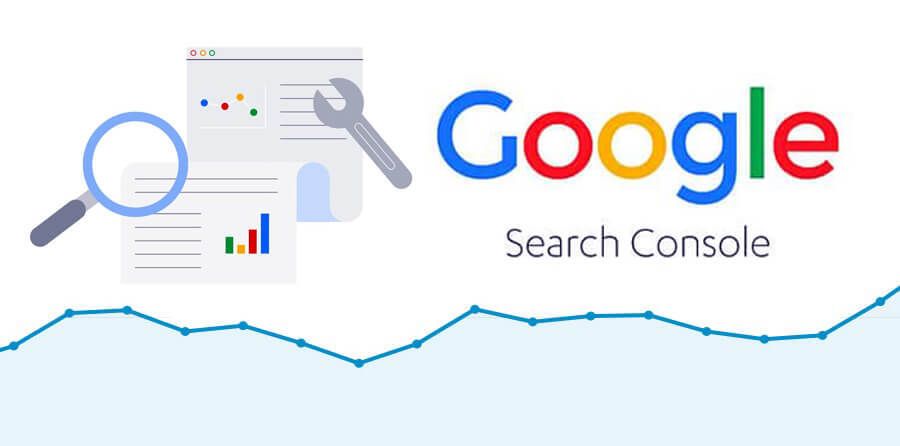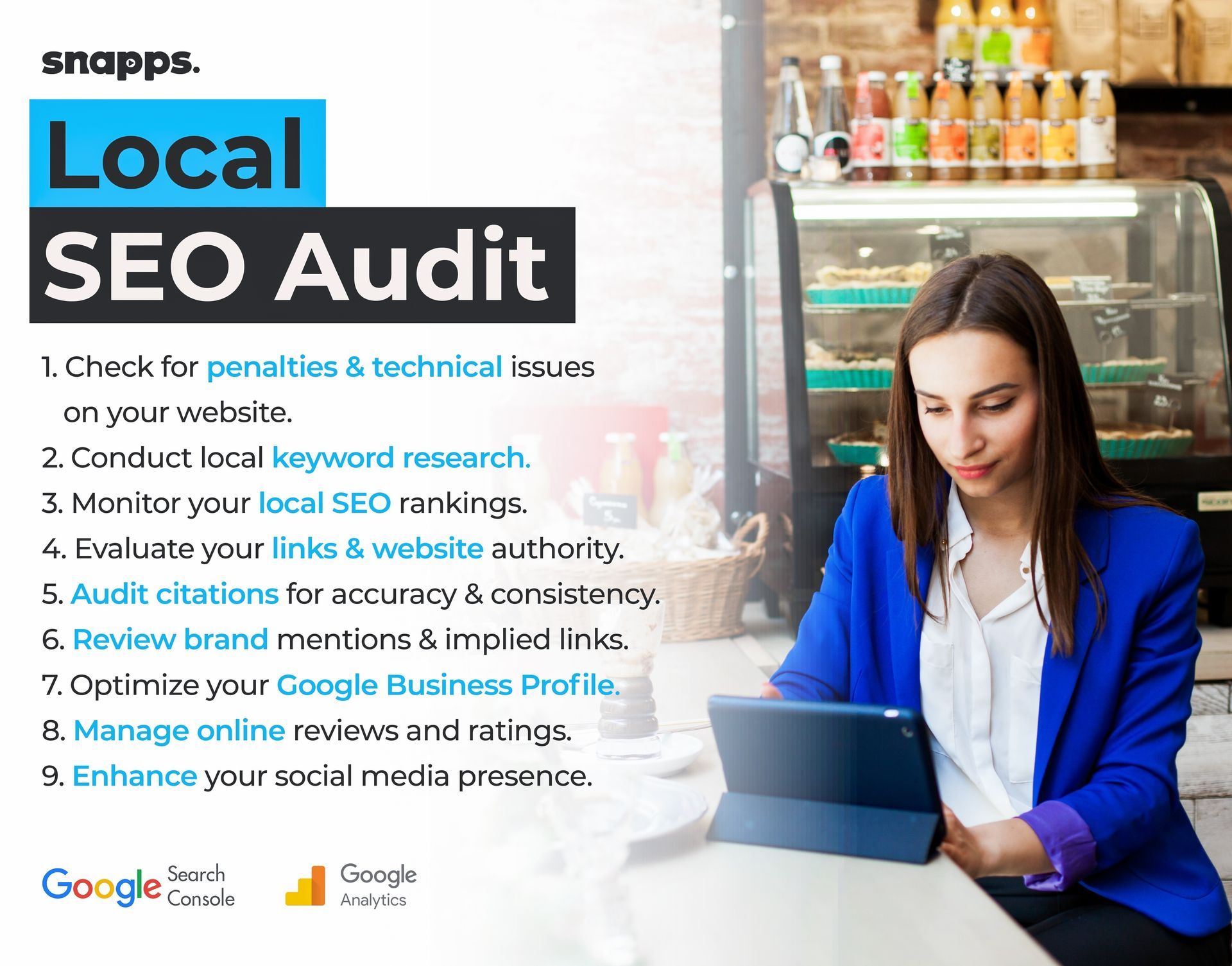Snapps courses are now available
In today's digital age, local businesses rely heavily on online visibility to attract customers and drive sales. A comprehensive local SEO audit is a crucial step towards optimizing your online presence and dominating local search results. In this guide, we will take you through the process of conducting a local SEO audit, complete with examples and actionable tips to improve your local rankings.
Why Conduct a
Local SEO Audit?

Understanding the
Importance
of Local SEO Audits
A local SEO audit provides you with valuable insights into the performance of your website and online presence in local search results. It helps you identify areas for improvement, uncover opportunities, and stay ahead of your competitors. By conducting regular audits, you can ensure that you are maximizing your visibility to capture local traffic and potential customers.
The
Impact
of Local SEO on
Business Success
To emphasize the significance of local SEO audits, let's consider an example. Imagine you own a local bakery in a bustling city. Potential customers who are looking for baked goods in your area will likely turn to search engines to find the best options. Without a strong local SEO strategy, your bakery may go unnoticed, while competitors with optimized websites and listings dominate the search results. By conducting a local SEO audit, you can identify areas where your website can be optimized to attract more customers and generate higher sales.
Key Elements of a Local SEO Audit

Website
Analysis
Start by evaluating the performance and structure of your website. Ensure that it is mobile-friendly, has fast loading speeds, and provides a seamless user experience. Optimize your website's title tags, meta descriptions, and headers to include relevant local keywords. Check for broken links and fix any technical issues that may hinder search engine crawling.
Local
Keyword
Research
Conduct thorough keyword research to identify the most relevant and highly searched terms related to your business and location. Use tools like Google Keyword Planner, Google Trends, and local directories to discover valuable keywords that can be incorporated into your website's content and meta tags.
Google My Business
(GMB) Optimization
Optimizing your Google My Business profile is crucial for local search visibility. Ensure that all the information in your GMB listing is accurate and up to date. Include your business name, address, phone number, and website URL. Choose the most relevant categories for your business and regularly update your business hours, photos, and posts. Encourage customers to leave reviews and respond to them promptly to build trust and credibility.
Related:
How Small Businesses Can Market Effectively Using Google Business Profile (GBP)
Citations and
Online
Directories
Consistent and accurate citations across online directories play a significant role in local SEO. Audit your business listings on various directories such as Yelp, Yellow Pages, and local chamber of commerce websites. Check for consistency in NAP (Name, Address, Phone Number) details, business descriptions, and categories. Correct any inconsistencies and ensure that your business information is up to date.
Online
Reviews
and
Ratings
Online reviews have a substantial impact on customers' decision-making process. Monitor and manage your online reviews on platforms like Google, Yelp, and Facebook. Respond to both positive and negative reviews in a professional and timely manner. Encourage satisfied customers to leave reviews, as positive reviews can boost your local rankings.
Tools for
Local SEO
Audit
Google Search Console

Google Search Console is a powerful tool for monitoring your website's performance in Google search results. It provides valuable insights into indexing issues, crawl errors, and penalties. Use this tool to identify and resolve any technical SEO issues that may be affecting your local search rankings.
Google Analytics

Google Analytics allows you to track website traffic, user behavior, and conversions. Utilize its data to gain insights into how visitors find and interact with your website. Analyze the effectiveness of your local SEO efforts by examining organic search traffic, bounce rates, and conversions from local search queries.

Conclusion
A local SEO audit is an essential process for businesses aiming to improve their online visibility and dominate local search results. By following the steps outlined in this guide and utilizing the recommended tools, you can identify areas for improvement and implement strategies to boost your local SEO rankings. Remember, regular audits and ongoing optimization efforts are key to staying ahead in the competitive local search landscape. Start auditing your online presence today and unlock the full potential of local SEO for your business.
FAQ:
The Ultimate Guide to Local SEO Audit: Boost
Your Online Presence
1. Why conduct a local SEO audit?
A local SEO audit helps identify areas for improvement, uncover opportunities, and stay ahead of competitors, maximizing visibility and attracting potential customers.
2. How does local SEO impact business success?
Without a strong local SEO strategy, businesses can go unnoticed while competitors dominate search results. Conducting a local SEO audit helps identify areas for optimization and generate higher sales.
3. What are the key elements of a local SEO audit?
Key elements include website analysis, local keyword research, Google My Business (GMB) optimization, citations and online directories, online reviews and ratings, and utilizing tools like Google Search Console and Google Analytics.
4. Why is GMB optimization important in local SEO?
GMB optimization improves local search visibility by providing accurate information, selecting relevant categories, and encouraging customer reviews.
5. How do online reviews and ratings impact local SEO?
Online reviews can boost local rankings and attract more customers. It is important to monitor and manage reviews, respond promptly, and encourage satisfied customers to leave reviews.
6. What tools can I use for a local SEO audit?
Google Search Console helps monitor performance, resolve technical issues, and gain insights, while Google Analytics tracks website traffic, user behavior, and conversions.
7. Why is ongoing optimization important for local SEO?
Ongoing optimization is crucial to stay ahead in the competitive local search landscape, ensuring continuous improvement and maximizing local SEO efforts.
Recent Articles
Our Support Heroes Are Here For You
Don’t waste time on tedious manual tasks. Let Automation do it for you. Simplify workflows, reduce errors, and save time for solving more important problems.



